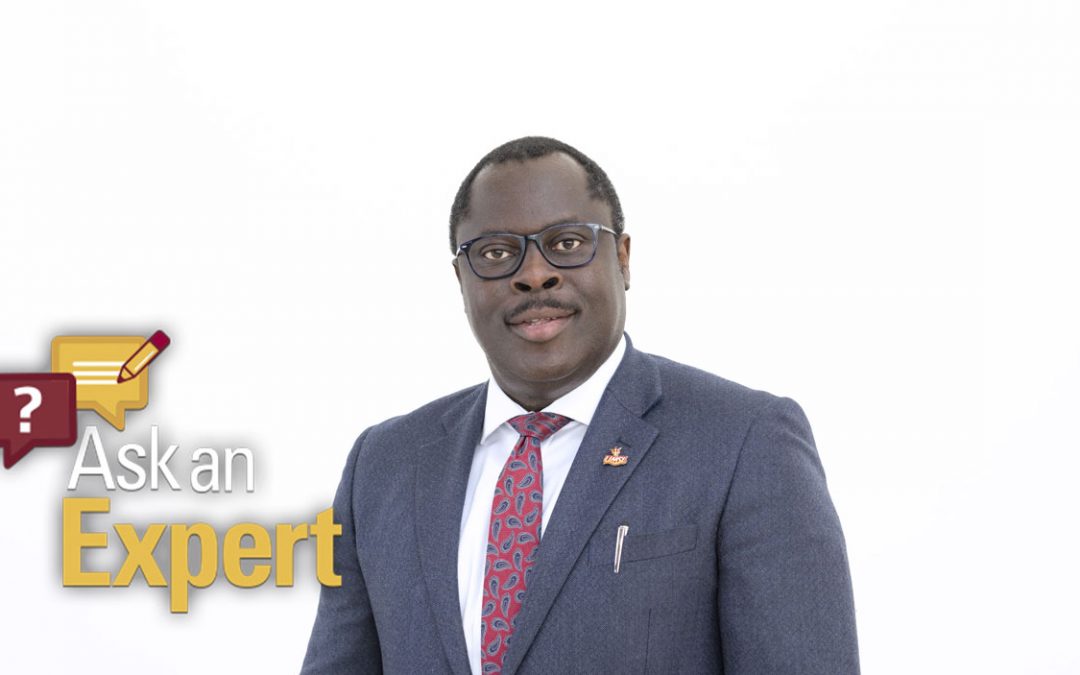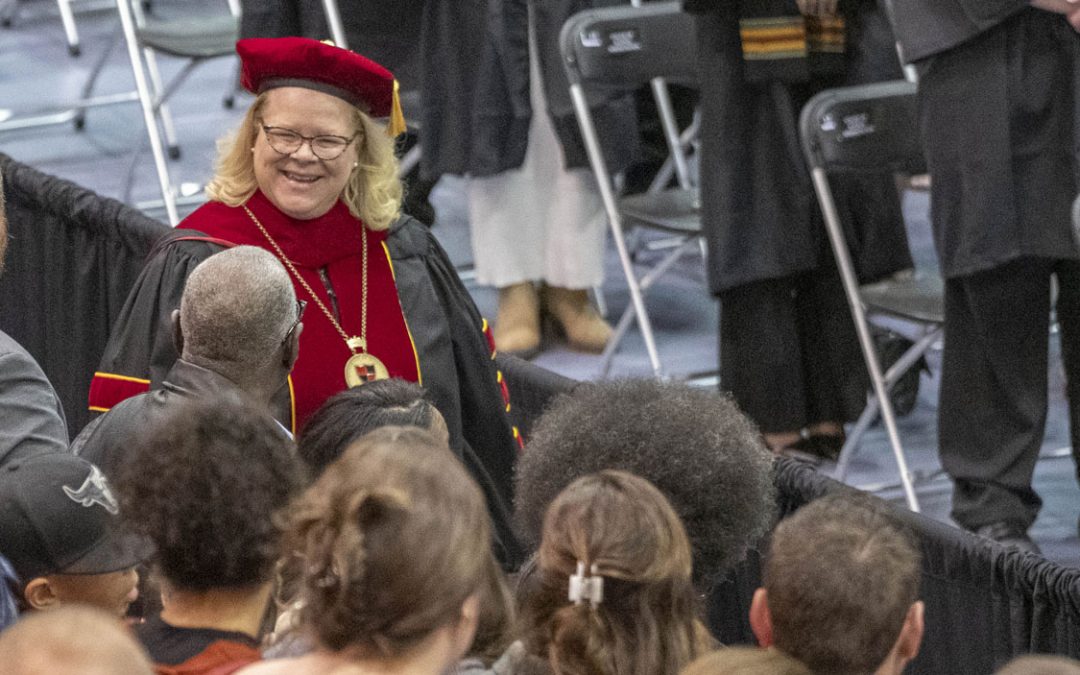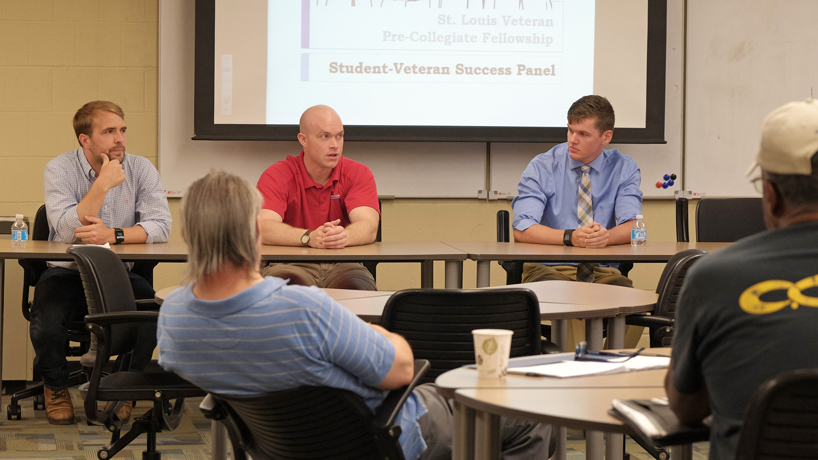
Capping off a week of intensive focus on the transition from military to university life, several current UMSL student veterans shared their perspectives with participants in the St. Louis Veterans Pre-Collegiate Fellowship program held on campus Aug. 8 to 12. They are (from left) political science PhD candidate Ryan Barrett, engineering major Bob O’Neill and criminology and criminal justice major Robert Simcoke. (Photos by August Jennewein)
After 22 years of service in the U.S. Marines, the whole “back to school” idea means something more for David Polinsky than the usual shift from summer sun to fall grind.
The major life change led the incoming University of Missouri–St. Louis student and other St. Louis military veterans to take advantage of a unique, free opportunity on campus earlier this month known as the St. Louis Veterans Pre-Collegiate Fellowship.
In its second year at UMSL, the five-day program is intended to equip service members for the transition to college even before classes start. Polinsky, who is majoring in psychology, called it a week well spent.
“It really allowed me to get back into the mindset of a student and connect with other veterans,” he said.
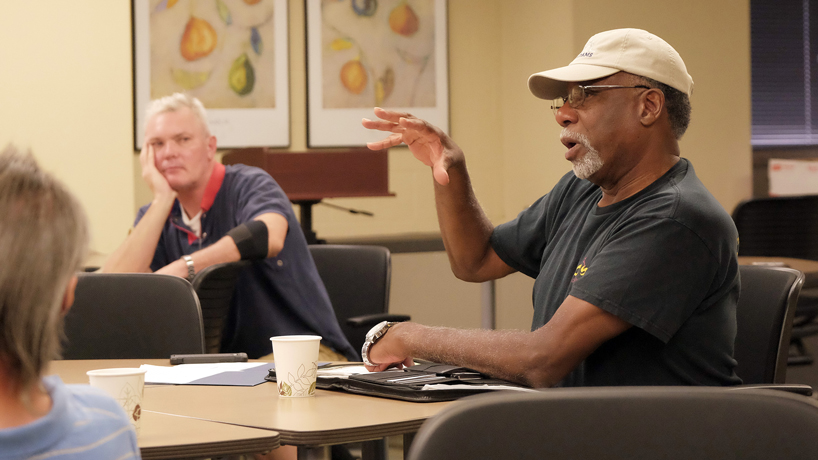
Vietnam-era veteran Andrew Shores (at right), who is returning to school to pursue public policy administration at UMSL, asks a question of student veteran panelists during the Aug. 12 conversation in Clark Hall.
Much of the time in Clark Hall, which houses UMSL’s Veterans Center, was devoted to building and reviewing key academic skills under the guidance of various instructors on hand to assist. That focus was by design, with the fellowship aiming to provide student veterans with the tools to thrive in a new environment that can often seem worlds away from military life.
But on the morning of Aug. 12 – the final day of the 2016 program – Polinsky and fellow participants heard from a few of those who have already navigated similar experiences. UMSL upperclassmen Bob O’Neill and Robert Simcoke joined graduate student Ryan Barrett for an open-ended panel presentation on “Balancing Work, Life and School.”
The three of them fielded questions ranging from whether they see themselves more as “veteran students” or “student veterans,” to how to get the most bang for one’s educational-benefit buck, to what it’s like to be back in a classroom with a lot of younger people.
Barrett, who is soon headed to Russia to conduct research toward his dissertation, recalled a couple classroom moments early on that took some adjusting. A U.S. Air Force veteran whose five years of service included deployments to both Iraq and Afghanistan, he admitted to briefly stepping out of class a time or two early on in his college experience during a frustrating discussion.
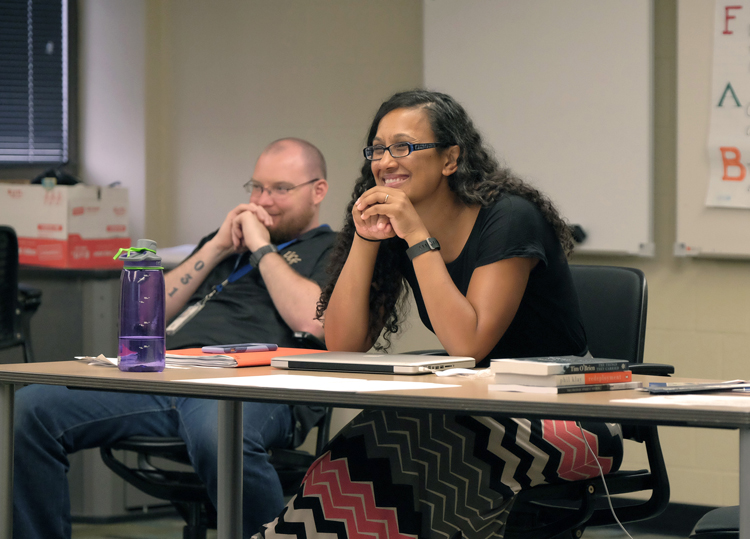
In collaboration with UMSL and local veteran-community partners, Jennifer Goetz, a graduate student in Washington University’s Brown School of Social Work, served as director of the weeklong 2016 St. Louis Veterans Pre-Collegiate Fellowship, which was free to participants.
“There were people in my classes who had watched five minutes of CNN and thought they had Afghanistan figured out,” Barrett told the group. He added that it was important to him to “not sound like a know-it-all” among classmates – but also to share his military insights in ways that build understanding.
“I think that sometimes [even professors] hesitate with how to approach veterans because they think we’re going to explode or something,” Barrett said. “We have an opportunity to explain to civilians what our experience was.”
The conversation also touched on practical tricks and tips, and a common refrain centered on the UMSL Veterans Center, which is overseen by Rebecca McMenamin.
“If I have a question about my VA benefits, I just go to Rebecca,” said Simcoke, who is finishing up his degree in criminology and criminal justice.
O’Neill, who is enrolled in the UMSL/Washington University Joint Engineering Program, advised the fellowship participants to make studying a top priority, even as they juggle a variety of responsibilities in their lives. A 20-hour-per-week job is probably a good limit for those balancing both work and school in his view.
“You’re going to spend a lot of time studying and doing homework, and there’s only so much time in the day,” O’Neill said.
Open to local veterans heading back to school at any college in the St. Louis area, the weeklong effort was a collaboration of UMSL and other St. Louis-area partners. Jennifer Goetz, who is pursuing her master’s degree in social work at Washington University in St. Louis and is herself a veteran, served as director.
“I really enjoyed the opportunity to participate in this year’s fellowship and to be able to work with an outstanding group of veterans, faculty, staff and community supporters,” Goetz said. “What was most impressive about the fellowship was the truly collaborative nature of this effort across several academic and community partners – Prism Medical U.S., which funded the fellowship, Missouri Veterans Endeavor, UMSL, St. Louis Community College, Washington University, Veteran Affairs, several veteran service organizations and multiple community agencies.
“This demonstrates the power of community collaboration for positive outcomes. I look forward to witnessing the success of this year’s newest student veterans.”
Andrew Shores, who served in Vietnam and is now a student in UMSL’s Public Policy Administration program, described the fellowship experience as critical.
“Every veteran who comes back to school should go to this,” he said.













